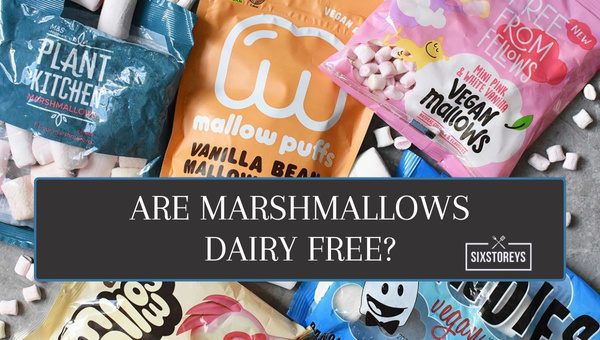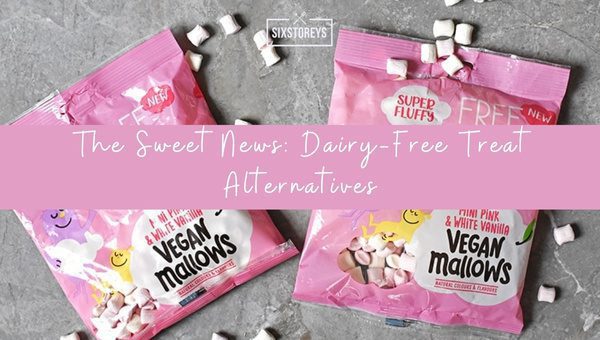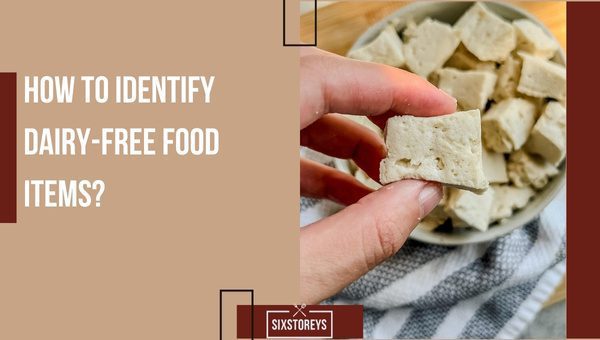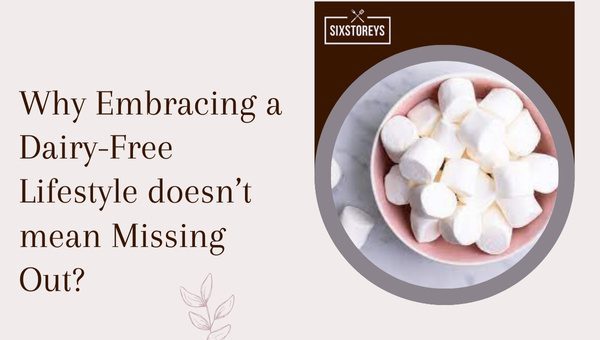Are Marshmallows Dairy Free? Discover the Reality
Marshmallows: their sweetness sends a shiver of pleasure down your spine, and their fluffy texture just screams fun. Whether roasted over a campfire or sprinkled atop a mug of hot chocolate, they seem pretty harmless, right? But wait a moment; have you ever stopped to wonder: "Are marshmallows dairy free?"
In the world of tantalizing candies and sugary treats, it's essential to dive deeper into ingredient lists, especially for those with specific dietary needs. Unraveling the truth behind this simple question can make all the difference for people on a dairy-free diet. Let's embark together on a quest to discover whether your favorite sugary pleasure aligns with dairy restrictions or whether it's time to find a new favorite treat.
Also Read: Is Velveeta Gluten & Dairy Free?
Article Includes
Are Marshmallows Dairy Free?

Yes, traditional marshmallows are indeed dairy-free! Now, before you start throwing a marshmallow party to celebrate, it is important to understand why and what this means for you.
Marshmallows: The Ingredients
You may be surprised to learn that marshmallows contain very few ingredients. Most marshmallows are made up of four key components:
- Sugar: The primary component that gives them that oh-so-delicious sweetness.
- Water: Crucial for blending the ingredients together.
- Gelatin: This is what gives the marshmallow its satisfyingly squishy texture.
- Cornstarch or confectioner's sugar: Used to prevent the marshmallows from sticking together in the bag.
Notice something missing from the list? It's dairy! Traditional marshmallows do not contain dairy or dairy derivatives. But why does this matter?
Dietary Restrictions & Allergies
For people on a dairy-free diet, either by choice or due to health conditions like lactose intolerance or an allergy, knowing whether marshmallows are dairy-free is a big deal. Luckily, marshmallows pass this test and can be enjoyed by those of us avoiding dairy.
However, it's a different story if your diet prohibits gelatin. The gelatin in marshmallows typically comes from animals, making traditional marshmallows unsuitable for vegetarians, vegans, or those following certain religious dietary guidelines.
It's All About The Labels
The above list applies, for the most part, to classic, commercial marshmallows. However, like most food, manufacturers can sometimes change the recipe, introducing other ingredients that could potentially include dairy. Therefore, even if most marshmallows are dairy-free, always remember to check the ingredients list on the packaging.
PRO TIP: Manufacturers must by law list common allergens like milk on the label, so watch out for this when buying marshmallows!
The Sweet News: Dairy-Free Treat Alternatives

Isn’t food just delightful? But what happens when dietary restrictions come into play? Those living a dairy-free lifestyle know this quandary all too well. However, the world of sweets and treats hardly ends with a dairy intolerance or choice. There are plenty of delightful, dairy-free alternatives waiting out there, just ready to satisfy your sweet tooth.
Jelly Beans and Gummies
Gummy bears, jelly beans, and other such candies often don't involve dairy in their preparation. Go ahead, enjoy these little bundle of joys without breaking your diet! But remember, whenever unsure, always double-check the ingredients.
Dark Chocolate
While milk chocolate gets a resounding "no" from the dairy-free community, its healthier counterpart, dark chocolate, usually gets a thumbs up. High-quality dark chocolate, with high cocoa content, typically doesn't contain dairy products. Plus, it's packed with antioxidants!
Sorbet
Shout out to all the ice-cream lovers! If you have been missing ice-cream, turn your attention towards sorbet. This fruity frozen dessert commonly skips milk or cream, making it the perfect substitution for a hot summer day.
Fruit-Based Desserts
Fruit tarts with a gluten-free crust, apple crisps, or even a simple fruit salad topped with dairy-free whipped cream can make for sumptuous desserts. Fruits packs a powerful, sweet punch while staying comfortably within your dietary boundaries.
Dairy-Free Baking
Fret not my baking enthusiasts, dairy-free butter substitutes exist! You can whip up some delicious cookies, brownies, or cakes using dairy-free substitutes like avocado, coconut oil, or applesauce.
Why is Dairy a Concern in Food Allergies?
When you hear about food allergies, dairy is bound to be on the list. It comprises a group of proteins found in milk and milk products that often trigger an overactive immune response in some individuals. This allergic reaction can range from mild symptoms, like skin irritation, to life-threatening conditions, such as anaphylaxis. For these individuals, consuming dairy can be a serious threat to their health and wellbeing. Lactose intolerance is another common issue, where people lack the essential enzyme, lactase, to properly digest lactose, a sugar found in milk.
It’s important to note that not everyone who avoids dairy does so because of an allergy or intolerance. Some may opt for a dairy-free diet due to health reasons, ethical beliefs, or personal preference. Regardless, having knowledge about what's on your plate (or in your dessert) is crucial.
How to Identify Dairy-Free Food Items?

Spotting dairy-free food items on a supermarket shelf or even in your pantry can sometimes feel like searching for a needle in a haystack. But once you know what to look for, it's a piece of cake (dairy-free of course!).
First and foremost, look for labels that explicitly state “dairy-free.” Manufacturers are becoming increasingly mindful of dietary restrictions and allergies, and they often label products accordingly. Also, be on the lookout for the “contains: milk” or “may contain: milk” warnings that often appear on food labels. These are clear indications that the product, even if it doesn't seem to have dairy elements, could indeed contain traces of dairy.
Investigate the ingredient list. Milk, whey, lactose, and casein are some of the obvious dairy-derived ingredients to avoid. But be wary of lesser-known ones, like lactalbumin, diacetyl, or anything with the prefix ‘lacto-’.
Remember, also, that not all food labeled as "vegan" is necessarily dairy-free, and vice versa. The terms are not interchangeable, leading to a considerable amount of confusion. Vegan foods avoid all animal products, while dairy-free foods omit milk-based ingredients, but might still contain honey, eggs, or other animal-derived elements.
Navigating food labels can be tricky, but with plenty of caution and a keen eye, you'll be confidently identifying dairy-free foods in no time.
How to Make Dairy-Free Marshmallows at Home?
Crafting your own dairy-free marshmallows at home can seem daunting, but fear not! With a bit of patience and the right ingredients, you too can create these fluffy sweet treats in no time.
To start, you will need:
- 1 cup of water (divided)
- 3 tablespoons of gelatin (ensure it's a dairy-free brand)
- 2 cups of granulated sugar
- 1/2 cup of light corn syrup
- A pinch of sea salt
- 1 tablespoon of vanilla extract
- Powdered sugar for dusting
The process is relatively straightforward:
- Mix half of the water with the gelatin in a bowl and let it sit.
- Pour the remaining water, granulated sugar, and corn syrup into a saucepan. Heat over medium-high heat until the sugar has completely dissolved.
- Pour the heated mixture into the gelatin while continuously stirring.
- Once combined, mix on a high speed until it becomes thick and fluffy (about 10 minutes).
- Add in the sea salt and vanilla extract, then continue mixing for another 5 minutes.
- Spread the mixture evenly into a pan coated with powdered sugar, then leave it to set overnight.
- The next day, cut your marshmallows into squares, coating each cut with more powdered sugar to prevent them from sticking.
Remember, homemade marshmallows won't only cater to your specific dietary needs but also enable you to play around with flavors you love.
Why Embracing a Dairy-Free Lifestyle doesn't mean Missing Out?

Embracing a dairy-free lifestyle often presents itself as a challenge, primarily due to the misconception that it drastically limits food options. However, I'm here to tell you that's simply not the case. Going dairy-free does not mean you're doomed to a life of bland, unexciting meals.
There are now a plethora of dairy-free substitutions available, allowing you to relish the same dishes you've always enjoyed. From almond milk to coconut oil, plant-based cheeses to cashew cream sauces, there's an abundance of options to explore.
Moreover, many people have noticed significant health benefits after switching to a dairy-free diet, such as better digestion, reduced bloating, clear skin, and increased energy levels.
Furthermore, embracing a dairy-free lifestyle can also be a great opportunity to be more mindful of what we are putting into our bodies, enticing us into experimenting with foods and flavors we wouldn’t ordinarily have chosen.
So, going dairy-free? Fear not! There is a world of delicious variety and choice at your disposal, ensuring that you won't be missing out on anything.
Also Read: Best Vegan Butter Brands
Frequently Asked Questions
What are the primary ingredients in marshmallows?
Basic marshmallows are created using sugar, water, air, and a whipping agent/aerator, usually gelatin (which is derived from animal collagen), and typically also include corn syrup to prevent crystallization of sugar.
Are store-bought marshmallows vegan?
No, most marshmallows you find in stores aren't vegan. This is because they often contain gelatin, an animal-derived product. There are, however, vegan-friendly marshmallows available that use plant-based ingredients as an alternative to gelatin.
Can marshmallows trigger an allergic reaction?
It's always possible to have an allergic reaction to any food, depending on personal allergies. Most marshmallows are free of many common allergens like dairy, nuts, and gluten. However, they do contain gelatin, which is a potential allergen for some people.
Where can I find dairy-free or vegan marshmallows?
Dairy-free and vegan marshmallows can be found in most supermarkets in the health food section or online. Brands such as Dandies and Trader Joe's offer vegan marshmallows that are a tasty alternative.
Conclusion
Navigating food labels and packaging can initially seem daunting, but with a little knowledge, it becomes significantly easier. By now, you'll understand that most commercially produced marshmallows are, surprisingly, dairy-free. Yet, it's always advisable to check ingredients before indulging, just to be on the safe side.
Remember, being on a dairy-free diet doesn't mean you have to miss out on the sweetness of life. With a myriad of candy options available, staying informed means you can freely indulge your sweet tooth while adhering to your dietary needs. Be proactive, keep exploring, and don't let dietary restrictions hold you back from enjoying the simple pleasures in life, including marshmallows!
